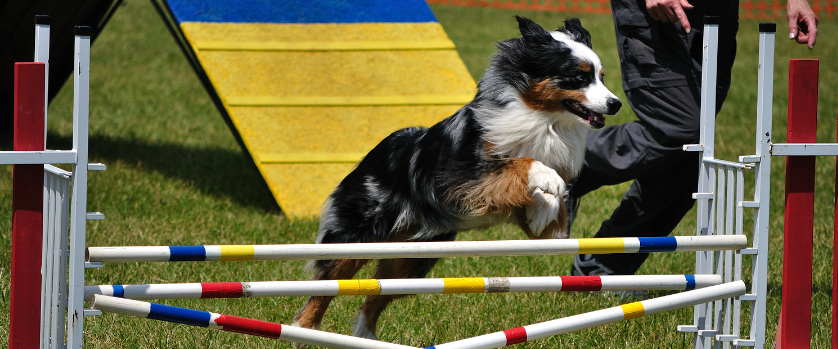Canine Athlete & Performance Dogs

Canine sports medicine is an established veterinary specialty and field of study. Since the early days, the AKC Canine Health Foundation (CHF) has been committed to being at the forefront of this field - providing grants for cutting-edge research into orthopedic concerns, proper nutrition and conditioning to achieve maximum performance while preventing injury, and innovative rehabilitation techniques.
Since its founding in 1995, CHF and its donors have invested more than $2.8 million to advance the study of canine orthopedic disease and topics related to the health of performance and working dogs.
Why Study It?
-
All dogs are athletes. Whether they chase squirrels in the yard, compete in agility, hunt with their owner, or enjoy neighborhood walks, they deserve the best care and treatment to help maximize their enjoyment in life.
-
Physiologic adaptations for exercise and sport are often species-specific. Techniques adapted from human and equine sports medicine must be validated and tailored to the canine athlete.
-
Cruciate ligament rupture is one of the most common orthopedic diagnoses in small animal practice and represents a significant financial burden for owners of affected dogs. A better understanding of the risk factors and preventive and treatment strategies for this condition will significantly impact quality of life for these families.
-
Recovery from neurologic or orthopedic surgery is faster and more complete when rehabilitation therapy is added to the treatment plan. Additional study will refine and augment these treatment techniques.
-
Breeding, raising, and training service and working dogs requires a significant financial investment. Studying ways to breed healthier dogs and keep them working longer benefits everyone - including the dogs.
Grants
Current CHF-Funded Studies
| 03076 | The Effect of Overweight and Obesity on Adult Stem Cell Function for Regenerative Therapies in Dogs |
| 03227 | Genetic Testing for Cruciate Ligament Rupture Using Polygenic Risk Score (PRS) Prediction |
| 02851-A | Development of Regional Anesthesia Techniques to Treat Chronic Painful Conditions of the Stifle and Elbow in Dogs |
| 03181-A | Characterization of Canine CD39 and CD73 for Use in Regenerative Medicine |
| 03068-A | AGILE (AGility Innovations Leveraging Electronics) - An Initial Study of Technology for Quantifying Canine Agility-specific Activity |
|
Articles
- Making Strides - Wearable Tech for Canine Athletes? (08/15/2023)
- A Clinician-Scientist Success Story (07/20/2021)
- Protecting Working Dogs and Canine Athletes from the Negative Effects of Hyperthermia (04/28/2021)
- Refining the Complex Genetics That Influence Canine Hip Dysplasia (02/18/2021)
Help Future Generations of Dogs
Participate in canine health research by providing samples or by enrolling in a clinical trial. Samples are needed from healthy dogs and dogs affected by specific diseases.
Help Future Generations of Dogs
Participate in canine health research by providing samples or by enrolling in a clinical trial. Samples are needed from healthy dogs and dogs affected by specific diseases.



